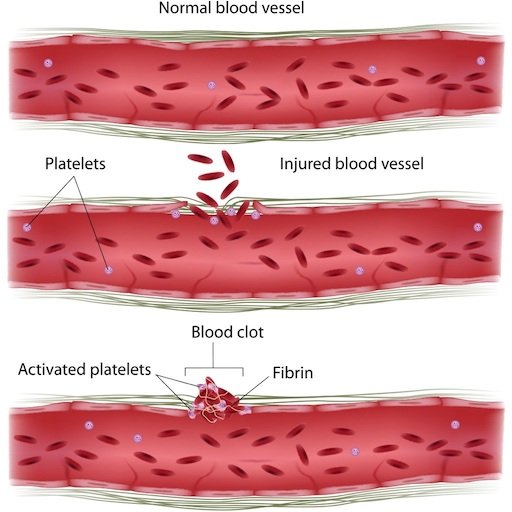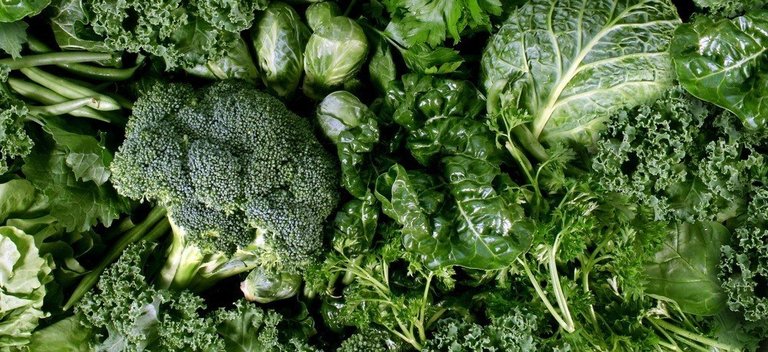Vitamin K is a fat-soluble vitamin, meaning it is stored in the body’s fatty tissues and liver. This means that fat is required in the diet to increase the amount of vitamin K that is absorbed (so without fat, vitamin K has nothing to dissolve into).
The ‘K’ in vitamin K comes from the German word ‘koagulation’, which translates to coagulation, the process of forming blood clots (i.e. changing from a fluid to a solid or semi-solid state).

source
Sources of vitamin K
Natural sources
- Vitamin K1, also known as phylloquinone. This is what we get from our foods and is most commonly found in leafy green vegetables (plant-sourced) 🥗
- Vitamin K2, also known as menaquinone. This type is created by our own intestinal bacteria and is also found in dairy products, eggs, meats and some fermented vegetables (animal- sourced) 🥛
Synthetic sources
- Vitamin K3, also known as menadione. A synthetic form that is a precursor to K2 (NB It is a very toxic compound and is not recommended).
- Vitamin K4, menadione bisulphite, and K5, phytomenadione, also exist and are water-soluble.

source
What is its role?
The primary role of vitamin K is to prevent bleeding by creating blood clots which basically clot/plug a cut, bruise or rupture somewhere in the body. Without going into too much science, vitamin K basically assists in blood clotting and coagulation by activating (turning on) enzymes and proteins that are known as ‘clotting factors’.
In addition, vitamin K is also important for bone health. Osteoblasts (cells that promote bone formation) make a protein called osteocalcin. This binds calcium which is then stored in the bone matrix. But before osteocalcin can do its job, vitamin K is needed to actually activate it and make it functional - only then can it can bind calcium and other essential minerals to allow bone growth ☠️
The vitamin K that is produced by our own gut bacteria usually makes enough for us to use, but sometimes it is not enough and dietary sources may be required. Dietary vitamin K is found in photosynthetic tissues (i.e. plants for you still playing along at home), and therefore can be found in pretty much anything that is green. The best sources are in green leafy vegetables, cabbage-like vegetables and some darker coloured fruits.

source
How much vitamin K should I get?
The values below for vitamin K are taken from the Nutrient Reference Values (NRV) for Australia and New Zealand and are presented as the ‘Adequate Intake’ (AI) for each age group.
When not enough evidence has been conducted to determine the ‘Recommended Dietary Intake’ (RDI), AI is used instead and refers to the average amount of a particular nutrient that healthy people tend to eat.
Infants
| Age (years) | Males (ug/day) | Females (ug/day) |
|---|---|---|
| 9 - 13 | 45 | 45 |
| 14 - 18 | 55 | 55 |
| >19 | 70 | 60 |
Like any vitamin and mineral, it is not entirely absorbed into the body and some will inevitably end up being excreted in our urine and feces. It is estimated that anywhere from 40 – 80% is absorbed from the food we consume.
Vitamin K deficiency
Deficiency of vitamin K is not particularly common, but can occur due to a number of factors and diseases and is usually treated via injection 💉

source
Digestive disorders/conditions
Because it is a fat-soluble compound, if fat absorption is not functioning properly, then vitamin K cannot be absorbed either. Some digestive disorders that have symptoms of fat malabsorption include;
- coeliac disease
- cystic fibrosis
- jaundice
- ulcerative colitis
- Crohn’s disease.
Antibiotics
Long-term use of antibiotics can reduce and destroy the number of intestinal bacteria leading to vitamin K deficiency.
Anticoagulants
Anticoagulant drugs like warfarin are used to oppose the effects of vitamin K, by preventing thrombosis and stopping clots from occurring in places like blood vessels and the heart. Anticoagulants, therefore, interfere with vitamin K activity and eating consistent, stable levels of vitamin K rich foods can help prevent deficiencies.
Infancy
Babies do not have an established intestinal bacteria at birth and therefore no vitamin K2. For this reason, newborns are given vitamin K orally or via injection until bacteria become properly established 👶

source
Vitamin K toxicity
There are no reported cases of toxicity from dietary sources of vitamin K and are therefore considered non-toxic. The synthetic versions, on the other hand, are toxic and may damage erythrocytes (red blood cells) causing anaemia 💀
Thank you so much if you got this far. I truly appreciate you taking the time to digest some of my content 😁
/Images are my own, sourced from Pixabay or linked/
Drew's Digest #03 - Everything You Ever Need To Know About Pomegranates 😍
Drew's Digest #02 - How Genetics Will Define Our Future Diets 👨🏻🔬
Drew’s Digest #01 - Everything You Ever Need To Know About Avocados 🥑
Nice informative post, I love reading and seeing these type of posts. Being Vegan myself I feel it is important to publish the information so people who are not at least plant based can see the multiple benifits of a plant based Vegan Diet.
Upvoted, resteemed and following too! Keep it up. I'm going to have a look through your blog now.
Thanks bro, I love the support. Yea I think these types of posts that hit the main points but aren't super technical are great for anyone to read. Glad to have you as a follower 🤙🏼
@originalworks
The @OriginalWorks bot has determined this post by @thedrewtrott to be original material and upvoted it!
To call @OriginalWorks, simply reply to any post with @originalworks or !originalworks in your message!
Very detailed post about this not so common vitamin K and all of its forms. Keep up the good work ! :)
Thanks so much for your reply - glad you enjoyed this post. Hope to see you back soon ✌🏼